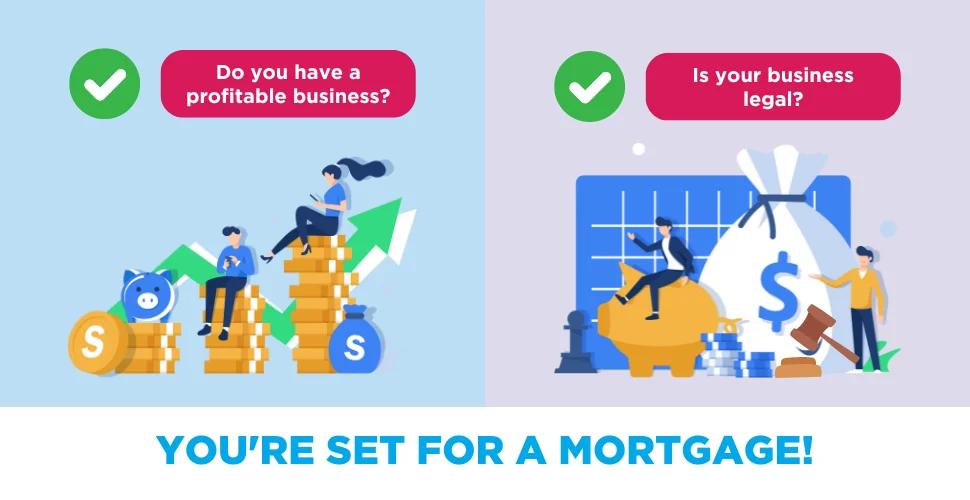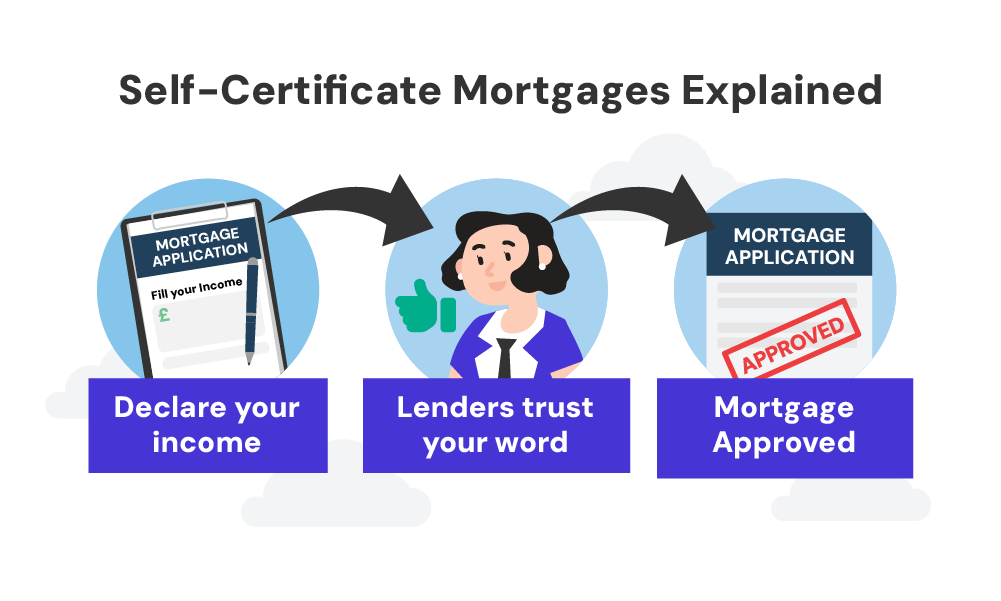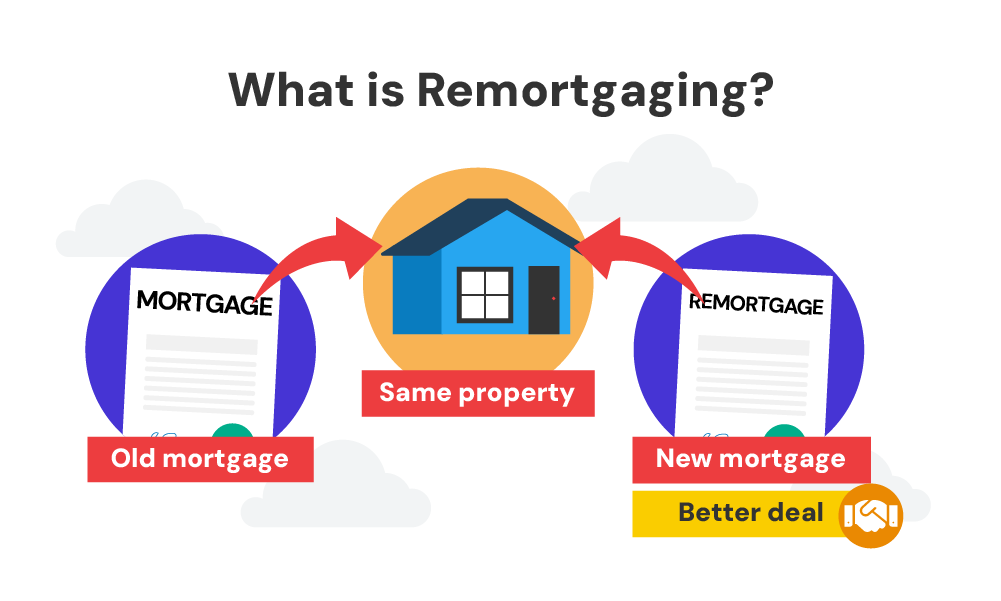- I’m Self-Employed with 1 Year’s Accounts: Can I Get a Mortgage?
- Why Is Getting Approved Tougher with Only 1 Year’s Accounts?
- How Can I Secure a Mortgage with Just 1 Yearâs Accounts?
- Are Specialist Lenders an Option for Me?
- Will My Business Type Affect My Mortgage Chances?
- How Much Can I Borrow with 1 Year’s Accounts as a Self-Employed Worker?
- Self-employed Mortgage Calculator
- How Do Lenders Calculate Income for Self-Employed with 1 Year’s Accounts?
- What Proof of Income Will Lenders Need from Me?
- What To Do If Mortgage Application Was Declined Due To 1 Year of Trading?
- Should I Wait for 3 Years’ Accounts or Seek a Specialist’s Help?
- Can I Get a Mortgage With 1 Yearâs Accounts Even With Bad Credit?
- Is Remortgaging an Option for Me with Only 1 Year’s Accounts?
- Key Takeaways
- The Bottom Line: Your Next Steps
How To Get Self-Employed Mortgage with 1 Year’s Accounts?

Securing a mortgage with only one year’s accounts is possible, even if you’re self-employed.
It might sound like a daunting prospect, especially when you consider the traditional challenges faced by self-employed individuals in the mortgage market.
But the good news is that options are available, tailored specifically to your unique situation.
This article is designed to guide you through the process of obtaining a mortgage if you’ve been self-employed for just a year.
Whether you’re a sole trader, running a company, or considering buy-to-let mortgages, there’s a path forward.
We’ll explore the types of mortgages you might qualify for, the lenders more likely to assist you, and the steps you can take to improve your mortgage chances.
Along the way, we’ll also address common concerns, such as the safety of specialist lenders and how much you might be able to borrow.
From understanding the potential roadblocks to discovering the best strategies to overcome them, you’ll find comprehensive insights here to support you on your journey to homeownership.
I’m Self-Employed with 1 Year’s Accounts: Can I Get a Mortgage?
The answer is yes, but it’s a bit trickier than if you had a longer track record of self-employment.
While most lenders prefer to see at least 2-3 years of accounts before they consider offering a mortgage, there are indeed lenders out there who will look at applications from those with just 1 year’s accounts.
That said, your options might be more limited, and you may find that it takes a bit more legwork to find the right lender.
But don’t let that deter you – it’s not impossible, and with the right approach, you could secure a mortgage that suits your situation.
Why Is Getting Approved Tougher with Only 1 Year’s Accounts?
If you’ve only been self-employed for a year, you might find it tougher to get a mortgage.
Why? Because lenders often see the uncertainty of your future earnings as a greater risk.
With just a year’s worth of accounts, they may struggle to gauge how affordable the mortgage might be for you in the long term.
Most lenders prefer a bit more reassurance, so they typically favour applications from those who have been self-employed for at least three years.
It’s not a closed door, though.
With perseverance and perhaps some expert guidance, you might find a lender willing to work with you, even if you’re relatively new to the world of self-employment.
How Can I Secure a Mortgage with Just 1 Year’s Accounts?
As discussed earlier, getting a mortgage with only one year’s accounts isn’t as impossible as you might think. But it does require some strategic planning and careful consideration.
Traditional high street lenders tend to favour applicants with longer trading histories. Because they see you as less risky if you’ve been in business for longer.
But, this doesn’t mean the door is closed if you’ve only got accounts for a single year. Here’s what you can do to boost your chances:
- Look Beyond Mainstream Lenders – Specialist lenders are often more flexible and willing to consider unique situations like yours.
- Save for a Heftier Deposit – If you can stash away more than 10%, it may boost your standing with lenders.
- Keep Your Debts in Check – Minimise what you owe elsewhere, so lenders see you as a responsible borrower.
- Prove Your Business is Thriving – Both your business and personal bank accounts can be your allies if they show good financial health.
- Maintain a Solid Credit Score – It’s a universal truth in the lending world; a good credit score can open doors.
Are Specialist Lenders an Option for Me?
Specialist lenders aren’t some shadowy entities operating outside the law. They’re just like any other lender, except they often deal with circumstances that are outside the mainstream.
What makes them stand out is their willingness to work with people in unique or challenging financial situations.
And yes, they are safe. They’re regulated by the Financial Conduct Authority (FCA), just like high street lenders.
Specialist or not, any lender you work with should adhere to the same strict regulations and standards.
Working with a good mortgage advisor who has access to both high-street and specialist lenders can help you navigate this terrain.
They’ll guide you to the right lender for your specific needs and circumstances. Trust the process, and remember, it’s about finding the best fit for you.
Will My Business Type Affect My Mortgage Chances?
The short answer is: probably not.
Lenders are more interested in the money coming in than what exactly you’re doing to earn it. But, it’s crucial to note that your business must operate within the bounds of UK law.
Engaging in any illegal activities would not only jeopardise your chances of securing a mortgage but could also lead to severe legal consequences.
It’s all about risk assessment for lenders. They want to know that you’ll be able to afford your monthly payments. So the sustainability of your income is what truly counts.
You can be in almost any field, legal and compliant with UK regulations, and as long as your business is producing a consistent and reliable income, lenders are likely to consider your application.

How Much Can I Borrow with 1 Year’s Accounts as a Self-Employed Worker?
If you’re self-employed and looking for a mortgage with only 1 year’s accounts, a specialist lender is probably your best option.
These lenders often allow self-employed applicants to borrow up to 5x their net income, even if their trading history is relatively short.
Even if you’ve been trading for only sixteen months. A specialist lender might look at your accounts for the first year and your net income for the next 4 months.
This is particularly helpful if your current income is much higher than what your filed accounts show.
Here’s how a specialist lender might break down your potential borrowing:
| Income Source | Net Income | Multiplier | Potential Borrowing |
|---|---|---|---|
| Filed Accounts (1 Year) | £40,000 | 5 | £200,000 |
| Current Income (4 Months) | £30,000 | 5 | £150,000 |
| Total | £350,000 |
In this example, the lender would consider both your filed accounts for the first year (£40,000) and your current income for the next 4 months (£30,000).
By multiplying both figures by a factor of five, the potential borrowing amount reaches £350,000.
This approach recognises that self-employed individuals often have unique financial situations, and it can be a significant advantage when you need a mortgage.
To ease the process, consider consulting with a mortgage broker experienced in handling self-employment cases. They can help you find the mortgage option that’s just right for you.
Self-employed Mortgage Calculator
Want to know how much you might be able to borrow? Try our self-employed calculator. It’s easy to use, and it’s made just for you.
How Do Lenders Calculate Income for Self-Employed with 1 Year’s Accounts?
When you apply for a mortgage, lenders typically focus on your net income to assess how much you can afford.
If you’re a company director, this calculation will likely include your salary and any dividends you might have taken.
In some special cases, they might even look into retained company profits to get a more accurate picture of your earnings.
Your net income tells lenders about your ability to make mortgage payments, so it’s a crucial factor in the application process.
If you’re a director and want to learn more about how your mortgage application might differ, you can find more information about mortgages for directors here.
What Proof of Income Will Lenders Need from Me?
To confirm your income, lenders will ask for specific documents.
The SA302 document is a common requirement, which outlines your income for tax purposes. It’s available online through the HMRC portal, or you can request it via post if you prefer.
But that’s not always the end of the story. Some lenders may ask for more, like your finalised accounts or even a reference from your accountant.
These additional documents help lenders feel confident in your income and ability to pay back the loan, ensuring they are lending responsibly.
Remember, every mortgage application is unique, and different lenders may have slightly different requirements.
It’s always wise to check with a good mortgage broker or directly with the lender to understand exactly what documents you’ll need to provide.
Having these ready can make the application process smoother and quicker.
What To Do If Mortgage Application Was Declined Due To 1 Year of Trading?
Being turned down for a mortgage after trading for just one year can be disheartening, but it’s not unusual.
Many high street lenders are cautious when dealing with self-employed applicants with limited trading history.
Remember the infamous credit crunch?
Back then, ‘self-certified’ mortgages were common, allowing self-employed individuals to essentially declare their income without the stringent checks we see today.
Unfortunately, these mortgages played a part in the 2007 financial crash.
Now, lenders are much more careful. They want to be sure that your income is stable and reliable before they commit to lending you money.
But don’t lose hope. There are specialist lenders who might be willing to consider your application, even with just one year’s accounts.

Should I Wait for 3 Years’ Accounts or Seek a Specialist’s Help?
Three years accounts are often seen as the golden standard by lenders. It gives them a detailed picture of your business and income, assuring them that you’ll likely be able to meet your mortgage payments.
If you’ve been trading for three years, you’ll generally have access to the same mortgage products as someone who’s employed.
With two years’ accounts, your options may be more limited, and with just one year’s accounts, you’ll probably need to look to specialist lenders.
So, should you wait? It depends on your situation and goals.
If you’re eager to buy now, a specialist lender might be the way forward, though it might not be an easy task to find the right one.
An experienced mortgage advisor who understands the needs of the self-employed could be invaluable here. They can guide you through the maze of lenders and products to find the right fit for your unique situation.
Pro Tip
Whether you decide to wait or pursue a mortgage now, remember that the more robust your financial history, the better your chances.
Building up that history takes time, so be patient and consult with professionals who can help you make the best decision for your future.
Can I Get a Mortgage With 1 Year’s Accounts Even With Bad Credit?
The idea of getting a mortgage with only one year’s accounts and bad credit might seem far-fetched, but it’s not entirely out of the realm of possibility.
You might find the market more restrictive, but with the right guidance and by choosing a suitable lender, you could still secure a mortgage.
A key factor will be your deposit. With minor credit issues, you’re probably looking at needing at least 15%. If your credit problems are more serious, expect to need a higher deposit.
Keep in mind that your mortgage rate is likely to be above average, and specialist lenders may charge higher fees to offset their risk.
But there’s a silver lining: if you manage your mortgage responsibly, YOU could repair your credit score and eventually remortgage to a lower rate.
Considering your unique situation, it’s wise to consult with an experienced advisor who can accurately assess your case and guide you on the path to approval.
Is Remortgaging an Option for Me with Only 1 Year’s Accounts?
Remortgaging might sound complicated, but it’s essentially like applying for a new mortgage – a process you might be familiar with.
If you’re self-employed with one year’s accounts, the information in this guide is equally applicable to remortgaging.
When it comes to remortgaging, lenders will be particularly interested in the equity in your property. You’ll need some equity if you want to remortgage, especially if you’re looking to release funds.
A consistent history of timely repayments could demonstrate to lenders that you’ve got a handle on your finances, making remortgage a more accessible option.
Remember, the landscape for remortgaging can vary, especially if you’re self-employed.
Speaking with a professional who understands the nuances of your situation can help you navigate the process and find the best deal for your needs.

Key Takeaways
- Getting a mortgage with only one year’s accounts is possible, but your options may be limited compared to those with a longer self-employment history.
- Lenders see a short trading history as a risk, so securing a mortgage may require more effort, a higher deposit, or working with specialist lenders.
- Specialist lenders are a viable option, as they cater to self-employed applicants with unique financial situations and shorter trading histories.
- Strengthening your application by maintaining a solid credit score, saving for a larger deposit, and demonstrating stable business income can improve your chances.
The Bottom Line: Your Next Steps
If you’re self-employed with just one year of accounts, getting a mortgage may seem like a daunting challenge.
This unique situation can create obstacles with traditional lenders, but it doesn’t mean that homeownership is unattainable.
Working with a specialised mortgage advisor who understands the intricacies of self-employment with limited accounts can be a game-changer.
They are equipped to guide you through the maze of mortgage applications, pinpointing lenders that are more likely to consider your individual circumstances.
These advisors know that your one year of trading doesn’t define your potential or reliability.
They can help you present your case in the best light, finding mortgage deals that align with your needs and financial situation.
Ready to take the next step? Reach out to us, and we’ll connect you with a self-employed mortgage broker who can turn your homeownership dream into a reality.
Get Matched With Your Dream Mortgage Advisor...

Frequently asked questions
Is the application process different for a buy-to-let mortgage if I'm self-employed?
When applying for a buy-to-let mortgage as a self-employed individual, lenders may still ask for proof of your income. However, a key consideration for many buy-to-let lenders is not necessarily your earned income but rather the potential rental income of the property.
For a detailed guide on buy-to-let mortgages specifically tailored for the self-employed, please refer to our specialised guide.
This article has been fact checked
This article was created, checked, and verified by the expert team at Money Saving Guru. Trust us, you’re in good hands.




